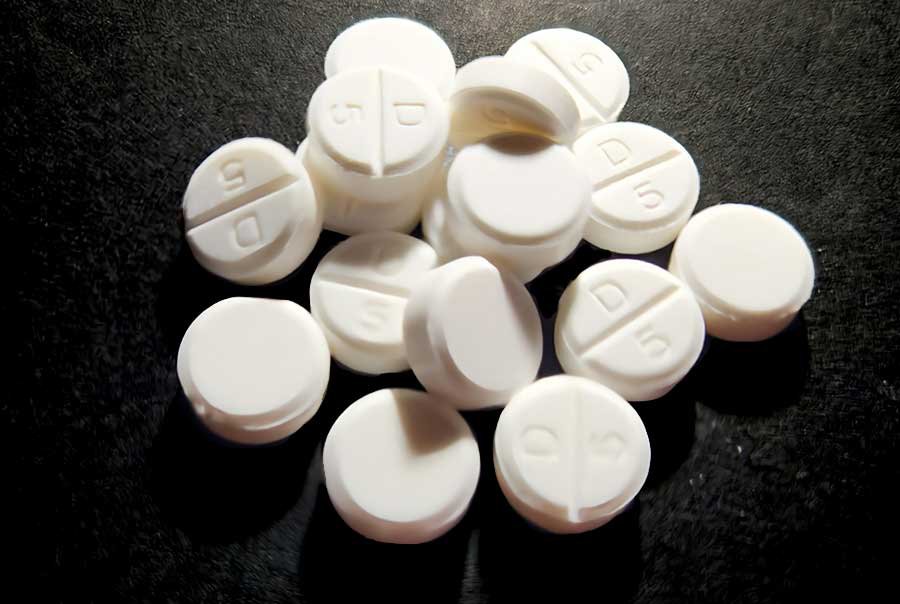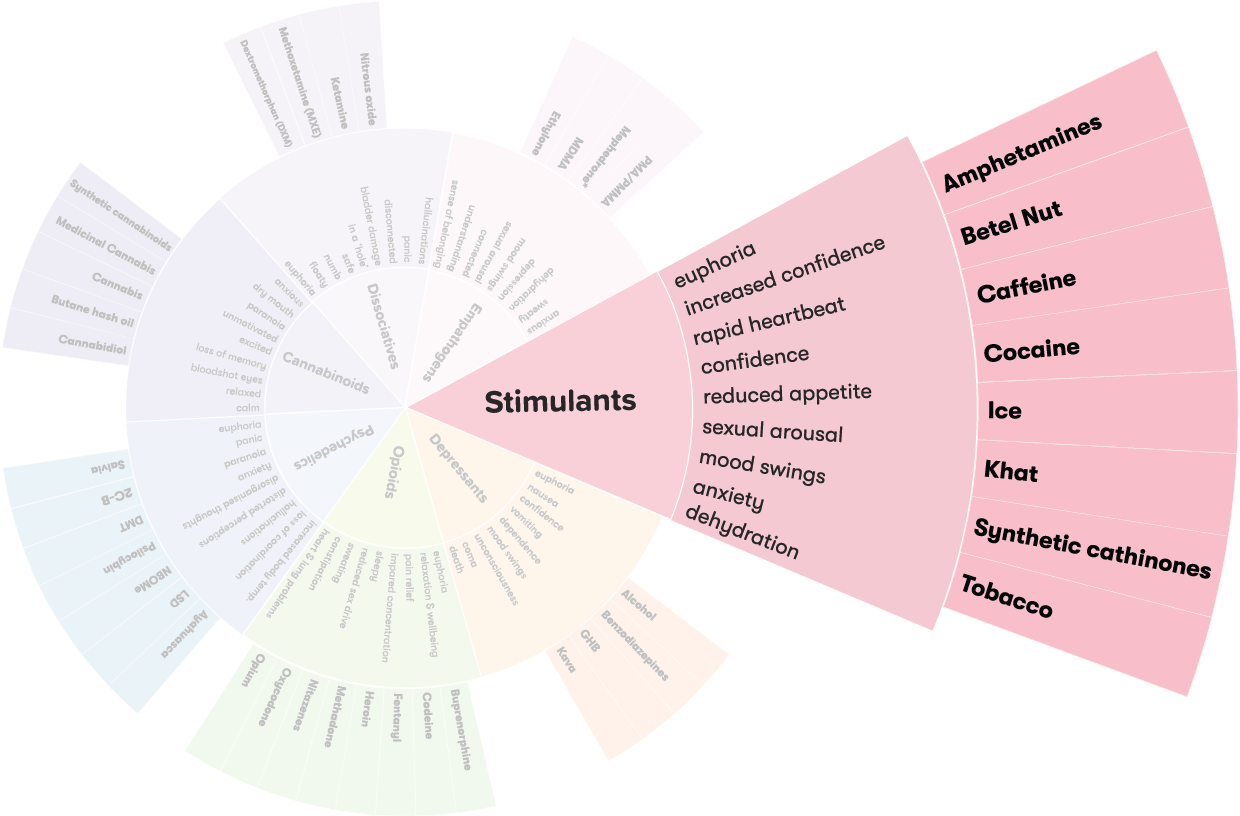How is dexamphetamine used?
Dexamphetamine is usually swallowed or crushed and snorted, but is sometimes injected or smoked/inhaled.7
Effects of dexamphetamine
Use of any drug can have risks. It’s important to be careful when taking any type of drug.
Prescribed stimulants work on the parts of the brain involved in regulating attention and arousal (being alert and awake). The medications can greatly improve concentration, impulse control and hyperactivity in about 80% of children with ADHD.8
In adults, attention deficit hyperactivity disorder is quite different —and the symptoms are unique for each individual.9 It is estimated that around 533,300 adults (aged 20+) have ADHD in Australia.10
Dexamphetamine affects everyone differently based on:
- size, weight and health
- whether the person is used to taking it
- whether other drugs are taken around the same time
- the amount taken.
The effects of dexamphetamine may include:
- enhanced mood and/or motivation
- increased energy and/or confidence
- increased alertness and/or focus
- fast heartbeat.11
Side effects may include:
- nausea
- vomiting
- abdominal pain
- headache
- dizziness
- mood changes such as depression or irritability
- increased heart rate and blood pressure
- heart palpitations
- restlessness, nervousness, tremor
- sleep difficulties
- loss of appetite, or weight loss.3
Side effects are generally mild and more likely to occur during the first few days of treatment, and may disappear as the body adjusts.3
The effects of the short acting tablet can last around 4 to 6 hours and the long acting can last for approximately 8 to 12 hours.12
Overdose
If you take more than the recommended dose you could overdose.
Call an ambulance straight away by dialling triple zero (000) if you, or someone else, has any of the following symptoms (Emergency services are there to help and can provide instructions over the phone):
- nausea & vomiting
- diarrhoea
- chills
- sweating
- headache
- pain or tightness in the chest
- shortness of breath
- fast, irregular heartbeat
- seizures (fits)
- weakness in the limbs or face
- confusion, delusion or hallucinations.3
Coming down
Experiencing comedown effects is less likely when dexamphetamine is taken as prescribed, but some people may still may still experience a comedown or ‘crash’ after use.13-16
Comedown effects can be more likely when dexamphetamine isn’t taken as prescribed (also called non-prescribed use) and can include feeling exhausted, restless sleep, irritability and anxiety.13-16
If you experience any effects that worry you, speak with your prescribing doctor or specialist.
Long-term effects
Regular use of dexamphetamine over a long-period has been linked to:
- cardiovascular complications
- reduced growth (weight and height) in children.13,14
Dexamphetamine and mental health
For some people, dexamphetamine use can lead to:
- increased anxiety
- trouble sleeping/insomnia
- psychosis/psychotic symptoms.18
The risk of experiencing psychosis or psychotic symptoms is higher when dexamphetamine isn’t taken as prescribed, especially for long periods at high doses. Psychosis is when someone loses the ability to distinguish between what is real and what isn’t real. It can includes symptoms such as paranoia, delusions, and hallucinations.19,20
If you have a history of anxiety, insomnia or psychosis, speak with your prescribing doctor about whether dexamphetamine is suitable.18
Tolerance and dependence
For people who take dexamphetamine as prescribed, they may feel they depend on them to manage their condition and/or regular functioning. It’s also possible to build up a tolerance, where they may feel like they need higher doses to manage their condition.21 If you have any concerns around tolerance or dependence, speak with your prescribing doctor.
People who regularly use dexamphetamine not as prescribed can develop tolerance and become dependent on the drug.
Mixing dexamphetamine with other drugs
Mixing dexamphetamine with other drugs can have unpredictable effects and increase the risk of harm.
- Dexamphetamine and other stimulants (speed, ice, caffeine, cocaine etc.): Combined stimulants increase strain on heart, anxiety & risk of stroke.
- Dexamphetamine and alcohol: may feel less intoxicated due to stimulant effects of amphetamine and lead to drinking more. Increases risk of alcohol poisoning.
- Dexamphetamine and tricyclic antidepressants/MAOI inhibitors: increased heart rate and blood pressure.22,23
More on Polydrug use
Polydrug use is a term for the use of more than one drug or type of drug at the same time or one after another. Polydrug use can involve both illicit drugs and legal substances, such as alcohol and medications.
Reducing Harm
There are ways you can reduce the risk of harm when taking dexamphetamine prescribed to you:
- Only take as prescribed and don’t change dose without first speaking with your prescribing doctor/specialist
- Check with your doctor before taking any other medications or supplements
- Until you know how dexamphetamine affects you, be careful when driving, operating machinery or doing heavy exercise
- Avoid mixing dexamphetamine with alcohol or other drugs Reducing the risk of harm from non-prescribed use:
- Use where you feel safe and with people you trust, and always tell someone what you’ve taken
- Avoid driving or operating machinery after use
- Always use sterile injecting equipment and never share injecting equipment
- Safely dispose of used injecting equipment
- if you’ve never used it before, start with a small amount and wait for effects
- avoid mixing with other drugs, including alcohol
Withdrawal
Most people don’t experience withdrawal effects after stopping if the recommended dose is taken. Some children stop taking the medication on the weekends and school holidays and do not experience any adverse effects.8
But some people may experience withdrawal effects. The risk of experiencing withdrawal is higher if using dexamphetamine non-prescribed over longer periods of time. Symptoms can include:
- cravings
- extreme fatigue/tiredness
- anxiety, depression or irritableness
- increased appetite
- restless sleep.25
Getting Help
If your use of dexamphetamine is affecting your health, family, relationships, work, school, financial or other life situations, or you’re concerned about a loved one, you can find help and support.
- Call the National Alcohol and Other Drug Hotline on 1800 250 015 for free and confidential advice, information and counselling about alcohol and other drugs
- Help and Support Services search. Find a service in your local area from our list. Simply add your location or postcode and filter by service type to quickly discover help near you.
If you're looking for other information or support options, send us an email at druginfo@adf.org.au
Path2Help
Not sure what you are looking for? Try our intuitive Path2Help tool and be matched with support information and services tailored to you.
Find out more
Using dexamphetamine without a prescription from a doctor, psychiatrist or paediatrician, or selling or giving it to someone else is illegal.26
There are also laws against forging or altering a prescription or making false representation to get dexamphetamine or a prescription for it.26
- Upfal J. Australian drug guide : the plain language guide to drugs and medicines of all kinds. Melbourne, Vic.: Black Inc.; 2016 [05.06.2024].
- Australian Government Department of Health. How drugs work: Leaner's Workbook - Classifying drugs by their effect on the central nervous system 2004 [05.06.2024].
- Aspen Pharma Pty Ltd. Aspen Dexamfetamine dexamfetamine sulfate 5 mg tablets Consumer Medicine Information 2021 [05.06.2024].
- Australian Institute of Health and Welfare. National Drug Strategy Household Survey 2022–2023 2024 [29.02.2024]. Available from:
- Health Direct. Dexamfetamine (Aspen) 2023 [cited: 14.02.2023].
- Health Direct. Dexamfetamine (Aspen) 2023 [05.06.2024].
- Teter CJ, McCabe SE, LaGrange K, Cranford JA, Boyd CJ. Illicit use of specific prescription stimulants among college students: prevalence, motives, and routes of administration. Pharmacotherapy [Internet]. 2006 [12.06.2024]; 26(10):[1501-10 pp.].
- Royal Children's Hospital Melbourne. Attention deficit hyperactivity disorder (ADHD) 2021 [05.06.2024].
- ADHD Foundation Australia. ADHD in Adults Recognizing the Signs and Symptoms of Adult ADHD and What You Can Do About 2018 05.06.2024].
- Deloitte Access Economics. The social and economic costs of ADHD in Australia 2019 [05.06.2024].
- Uebel-von Sandersleben H, Dangel O, Fischer R, Ruhmann M, Huss M. Effectiveness and safety of dexamphetamine sulfate (Attentin) in the routine treatment of children and adolescents with ADHD: results from a 12-month non-interventional study. Scandinavian Journal of Child and Adolescent Psychiatry and Psychology [Internet]. 2021 [10.05.2024]; 9(1):[73-86 pp.].
- Shoar N Marwaha R Molla M. Dextroamphetamine-Amphetamine 2022 [15.02.2023].
- Lohr D Wanta J Baker M Grudnikoff E Morgan W Chhabra D Lee T. Intentional Discontinuation of Psychostimulants Used to Treat ADHD in Youth: A Review and Analysis. Frontiers in Psychiatry [Internet]. 2021 [05.06.2024]; 12.
- Smith G Jongeling B Hartmann P Russell C Landau L. Long-term outcomes associated with stimulant medication in the treatment of ADHD in children 2010 [05.06.2024].
- Healthline. Vyvanse Crash: What It Is and How to Deal with It 2017 [14.05.2024].
- Healthline. Coping with the Comedown: Managing Adderall Crash [14.05.2024].
- Lohr D Wanta J Baker M Grudnikoff E Morgan W Chhabra D Lee T. Intentional Discontinuation of Psychostimulants Used to Treat ADHD in Youth: A Review and Analysis. Frontiers in Psychiatry. 2021;12.
- NSW Health. ADHD - frequently asked questions 2023 [16.05.2024].
- Kaye S, Darke S. The diversion and misuse of pharmaceutical stimulants: what do we know and why should we care? Addiction [Internet]. 2012 [16.05.2024]; 107(3):[467-77 pp.].
- Huang C-L, Tsai IJ, Lee CW-S. Risk of psychosis in illicit amphetamine users: a 10 year retrospective cohort study. Evidence Based Mental Health [Internet]. 2022 [16.05.2024]; 25(4):[163 p.].
- Handelman K, Sumiya F. Tolerance to Stimulant Medication for Attention Deficit Hyperactivity Disorder: Literature Review and Case Report. Brain Sci [Internet]. 2022 [21.05.2024]; 12(8).
- Psychonaut Wiki. dextroamphetamine 2023 [21.05.2024].
- Zealand MN. New Zealand Data Sheet: Aspen Dexamfetamine 2022 [21.05.2024].
24. Tucker JA, Darke, S, Lappin, J, Farrell, M. The Clinicians Guide to Illicit Drugs and Health: Silverback Publishing; 2019 [17.01.2024].
25. McGregor C, Srisurapanont M, Mitchell A, Longo MC, Cahill S, White JM. Psychometric evaluation of the Amphetamine Cessation Symptom Assessment. Journal of Substance Abuse Treatment [Internet]. 2008 [04.06.2024]; 34(4):[443-9 pp.].
26. Australasian Legal Information Institute.DRUGS, POISONS AND CONTROLLED SUBSTANCES ACT 1981 - SECT 4 Definitions 1981

